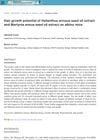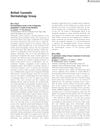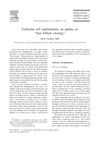 42 citations,
August 2013 in “International Journal of Women's Health”
42 citations,
August 2013 in “International Journal of Women's Health” Female pattern hair loss is caused by multiple factors and while treatments like topical minoxidil, hormone therapy, and low-level light therapy can help, none can fully cure it.
 19 citations,
April 2014 in “Hormones”
19 citations,
April 2014 in “Hormones” Hormones and genetics play key roles in male and female baldness, which can affect mental health and may be linked to other health issues.
August 2024 in “Nutrients” Probiotics help reduce hair loss and increase hair growth in people with androgenic alopecia.
 October 2023 in “Scientific Reports”
October 2023 in “Scientific Reports” Oxytocin may help hair grow by increasing hair growth-related genes and factors.
 August 2024 in “Frontiers in Nutrition”
August 2024 in “Frontiers in Nutrition” Antioxidant-rich diets may reduce hair loss risk, while pro-inflammatory diets may increase it, especially in women.
 April 2024 in “Nigerian Postgraduate Medical Journal”
April 2024 in “Nigerian Postgraduate Medical Journal” Androgenetic alopecia is a common hair loss condition influenced by various factors and linked to psychosocial and cardiovascular issues.
 February 2024 in “Archiv EuroMedica”
February 2024 in “Archiv EuroMedica” Annurca apple extract may help with hair growth and prevent hair loss.
 January 2024 in “Skin appendage disorders”
January 2024 in “Skin appendage disorders” Using growth factors and microneedling shows promise for hair regrowth in Alopecia Areata, but more research is needed.
17 citations,
June 2020 in “Anais brasileiros de dermatologia/Anais Brasileiros de Dermatologia” Scalp cooling is an effective way to prevent hair loss from chemotherapy.
 1 citations,
June 2023 in “Genes”
1 citations,
June 2023 in “Genes” Hair loss from Alopecia Areata is caused by both genes and environment, with several treatments available but challenges in cost and relapse remain.
 1 citations,
March 2024 in “International Journal of Pharmaceutical Sciences and Drug Research”
1 citations,
March 2024 in “International Journal of Pharmaceutical Sciences and Drug Research” Helianthus annuus and Martynia annua seed oils significantly promote hair growth.
 March 2024 in “Nutrients”
March 2024 in “Nutrients” Gynostemma pentaphyllum and its component damulin B could help hair grow by activating certain cell pathways.
October 2023 in “Nutrients” Millet and wheat extracts may improve hair health and promote growth.
 July 2024 in “Gene & Protein in Disease”
July 2024 in “Gene & Protein in Disease” Exosome therapy shows promise for treating skin conditions and improving wound healing.
 January 2024 in “Deleted Journal”
January 2024 in “Deleted Journal” Essential oils may help hair health but lack strong scientific proof and can cause allergic reactions.
 January 2023 in “Vìsnik problem bìologìï ì medicini”
January 2023 in “Vìsnik problem bìologìï ì medicini” Androgenic alopecia causes hair follicle degradation and skin restructuring, but some hair elements remain.
 3 citations,
January 2017 in “International journal of research - granthaalayah”
3 citations,
January 2017 in “International journal of research - granthaalayah” The traditional hair pack effectively reduced dandruff without any side effects.
 62 citations,
February 2016 in “ACS Applied Materials & Interfaces”
62 citations,
February 2016 in “ACS Applied Materials & Interfaces” Technique creates 3D cell spheroids for hair-follicle regeneration.
 April 2024 in “International journal of clinical trials”
April 2024 in “International journal of clinical trials” SesZen-Bio™ improves hair density, thickness, and overall hair health.
 21 citations,
August 2003 in “Seminars in oncology nursing”
21 citations,
August 2003 in “Seminars in oncology nursing” Nurses are crucial in managing chemotherapy side effects for ovarian cancer patients to improve their quality of life.
 4 citations,
August 2020 in “Applied Materials Today”
4 citations,
August 2020 in “Applied Materials Today” Hydrogel microcapsules help create cells that boost hair growth.
 67 citations,
January 2022 in “Theranostics”
67 citations,
January 2022 in “Theranostics” Advanced nanocarrier and microneedle drug delivery methods are more effective, safer, and less invasive for treating skin diseases.
 July 2021 in “British Journal of Dermatology”
July 2021 in “British Journal of Dermatology” Laser treatment for skin conditions VEN and ILVEN is effective and liked by patients.
 31 citations,
July 2015 in “Clinical, Cosmetic and Investigational Dermatology”
31 citations,
July 2015 in “Clinical, Cosmetic and Investigational Dermatology” Hair restoration surgery effectively treats hair loss with natural-looking results, using techniques like stem cells and platelet-rich plasma.
 8 citations,
September 2020 in “Journal of Cosmetic Dermatology”
8 citations,
September 2020 in “Journal of Cosmetic Dermatology” More people are searching for hair transplants online, preferring Follicular Unit Excision over Follicular Unit Transplant. There's also a rise in female patients and interest in beard, eyebrow transplants, and non-surgical treatments like platelet rich plasma.
 35 citations,
January 2014 in “Journal of Tissue Engineering”
35 citations,
January 2014 in “Journal of Tissue Engineering” Cell-based therapies using dermal papilla cells and adipocyte lineage cells show potential for hair regeneration.
 1 citations,
March 2021 in “Current Dermatology Reports”
1 citations,
March 2021 in “Current Dermatology Reports” Various treatments help hair growth, but more research needed for safety and effectiveness.
 2 citations,
May 2017 in “InTech eBooks”
2 citations,
May 2017 in “InTech eBooks” Stem cells could improve hair growth and new treatments for baldness are being researched.
 46 citations,
March 2013 in “Journal of Cosmetic and Laser Therapy”
46 citations,
March 2013 in “Journal of Cosmetic and Laser Therapy” Non-ablative and ablative fractional lasers helped hair growth in some cases without major side effects, but didn't work for all hair disorders.
 15 citations,
May 2004 in “Facial Plastic Surgery Clinics of North America”
15 citations,
May 2004 in “Facial Plastic Surgery Clinics of North America” The document concludes that while "hair follicle cloning" shows promise for unlimited donor hair, it faces challenges with consistency and safety in humans.



























